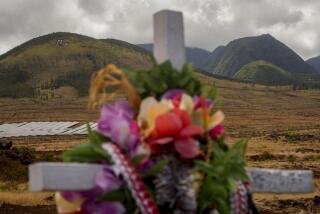‘Pineapple Island’ Residents See Way of Life Vanishing : Development: Farming is being phased out on Lanai and resorts are the new economic base. Many islanders prefer the old lifestyle.
- Share via
HONOLULU — Residents of “Pineapple Island” are worried that their plantation community is destined to become a playground for rich tourists.
Lanai’s 2,400 inhabitants face a dramatic change in lifestyle after almost a century of growing pineapples.
Castle and Cooke Properties Inc., a subsidiary of Dole Food Co., owns 99% of the 140-square-mile island, about 10 miles west of Maui and 70 miles east of Oahu. The company opened two luxury resorts and a golf course last year, and received approval in August to expand the resorts, add a second golf course and build 775 luxury homes.
Residents, including those who have worked in pineapple fields their entire lives, wonder how the change will affect them. Some question whether it is wise to tie the island’s economic fate to a tourism industry that has slumped the past two years, especially in the affluent-visitor market.
While even the most vocal critics concede that the pineapple industry no longer can be profitable on Lanai, they question the way the changes are being implemented and whether tourism can revitalize the economy enough to prevent Lanai’s youth from continuing to leave.
Some residents fear a loss of community atmosphere on the island, which has no stoplights or fast-food restaurants.
“With pineapple, everybody worked the same days, the same shifts. Social activities were built around the work schedule,” said Goro Hokama, a Lanai native and Maui County councilman who worked in the pineapple fields as a youth. “Hotels are seven days a week, 24 hours a day. It affects the social life. So does the influx of people from the mainland.”
Tom Leppert, vice president of Castle and Cooke Properties and the man in charge of Lanai’s development, says many of the changes would have occurred regardless of what the company did.
“Even without pineapple there are external changes affecting Lanai and every place else,” Leppert said. “This change has been minimized, but some people don’t want any change.”
Labor costs and increased competition from the Third World forced Dole to move most of its pineapple operations to Thailand and the Philippines, Leppert said. Dole will continue to grow pineapples on Lanai for its profitable local and West Coast fresh-fruit markets.
“Hawaii’s share of the market went from 40% at its peak in the 1970s and early ‘80s to below 10% now,” Leppert said. “The cost of producing pineapple in Hawaii relative to other markets is uncompetitive.”
Dole’s pineapple production on Lanai peaked at nearly 15,000 acres in the early 1980s. Only 300 acres of the current 3,600 acres being farmed were planted this year, and Leppert says no more than 100 acres will be planted next year.
Dole laid off 450 workers at its Oahu cannery last year and plans to lay off the remaining 450 cannery workers and close the plant this year.
Dole, the world’s largest pineapple producer, says it also is going to phase out its operations on Oahu. Del Monte closed its Oahu cannery in 1984, but continues to grow Hawaii pineapples for fresh-fruit markets. Maui Pineapple Co. is the only company that grows and cans pineapples at a profit in Hawaii.
Until last year, the only hotel on Lanai was the 10-room Hotel Lanai. The two new resorts, the Manele Bay Hotel and the Lodge at Koele, have a combined 252 rooms. Rates run from $295 to more than $2,000.
Leppert would not release occupancy rates, but says they are comparable to other island luxury hotels, although they are lower than the company would like. Residents say the hotels remain mostly empty.
Some residents are angry that the company is bringing in outside people, especially for management positions, instead of hiring locals.
“Locals hold the lower echelon of jobs,” Hokama said. “If people look at top decision-makers, all but one were imported.”
But it’s not easy to train farm workers to staff a five-star hotel where guests pay for and expect the best service.
“These people are basically farmers. To try to make them hotel workers, it’s not working,” said Ron McOmber, a 22-year Lanai resident and head of Lanaians for Sensible Growth, which claims almost 300 members.
Leppert says the company has tried to find jobs for Lanai residents, including those who previously left the island because they could not find work.
“There’s clearly a change from one industry to another, and that change shouldn’t be minimized,” he said. “But with pineapple not succeeding . . . the alternative is mass unemployment and a lack of an economic base. Then you’ll really lose the culture of the island.”
Even some supporters of the hotel development question Dole’s handling of the transition.
“I favor the development, but a lot of people are against it,” said Jay Ballesteros, 22, a lifelong Lanai resident. “They’re accommodating outside people more. If they accommodated local people more a lot of the opposition would disappear.”
There also is concern the luxury residential development will create a split between rich and poor, as existed in the 1920s when plantation managers and supervisors lived separate from workers in better housing on one side of town--the so-called “ haole camp.”
“The change is good, but not the expensive homes,” said Rosalina Bolo, a hotel housekeeper who moved to Lanai last year. “The cost of living already is too much on Lanai, and the homes would make it more expensive.”
Opponents say the island’s environment will be ruined by the additional growth, and worry about the effect tourists will have on beaches, scenic areas and historic sites.
Concerns about the environment are unfounded, Leppert says, since it is in the company’s best interest to keep the environment as clean as possible.
“We’re not just a hotel; our resort is an island,” he said. “We have a major investment, over $300 million. It’s in nobody’s interest more than ours to make sure that we maintain the environment in a double-A pristine state.”
Most of the residents interviewed opposed the changes.
“I liked working in the pineapple fields. It was more easy for me,” said Maria Ildefonso, 42, a 13-year Lanai resident now working as a housekeeper. “In the hotel, you have plenty bosses. In the field, there’s no one to tell you what to do.”
Lloyd Cockett, 22, a warehouse worker who has lived on Lanai his entire life, says, “A couple of my friends say they like working in the hotels, but most say they would rather pick pineapple. I wish Lanai was the same as before, without the hotels.”
Ronald Woolsey moved to Lanai from the island of Hawaii last year to take a job in construction. He sees nothing wrong with the development.
“Pineapple was going down,” he says. “I don’t see any problem with the change; it was going to come anyway.”
More to Read
Inside the business of entertainment
The Wide Shot brings you news, analysis and insights on everything from streaming wars to production — and what it all means for the future.
You may occasionally receive promotional content from the Los Angeles Times.







